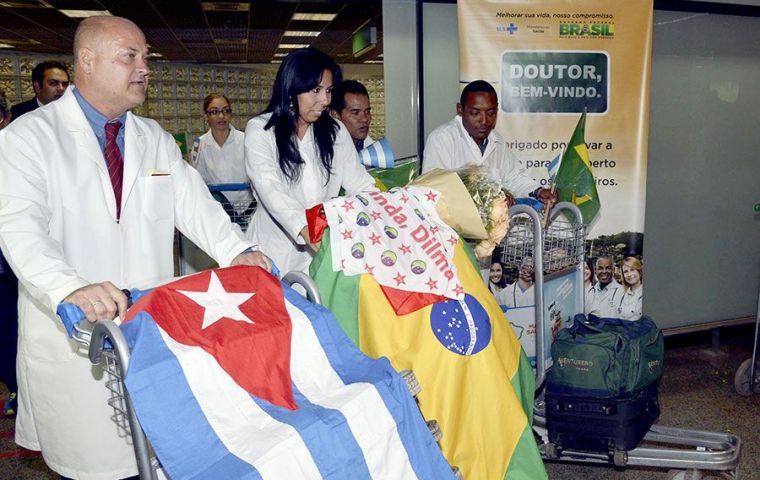MercoPress. South Atlantic News Agency
Brazil's secret dealings to contract Cuban physicians to work in the More Doctors program
 Cables show that Cuba proposed the program and the two countries had to negotiate for a year before President Dilma Rousseff presented in 2013
Cables show that Cuba proposed the program and the two countries had to negotiate for a year before President Dilma Rousseff presented in 2013  President-elect Jair Bolsonaro public statements about the program made Cuba withdraw from Mais Médicos
President-elect Jair Bolsonaro public statements about the program made Cuba withdraw from Mais Médicos Folha de Sao Paulo a leading Brazilian daily has revealed the secret negotiations between the administration of ex-president Dilma Rousseff and the Cuban government to contract Cuban doctors to work in Brazil.
Cables from the Brazilian embassy in Cuba show how the Cuban government negotiated with Brazil to create the “Mais Médicos”(More Doctors) program. Classified as confidential and kept in secrecy for five years, they have now been released and show a partially different story from the one presented to the Brazilian population.
The cables show, for example, that Cuba proposed the program and the two countries had to negotiate for a year before President Dilma Rousseff presented in 2013.
Negotiations were kept secret to avoid negative reactions from the Brazilian medical community. It was during these meetings that Cuba presented the demands that are now being criticized by president-elect Jair Bolsonaro. His public statements about the program made Cuba withdraw from Mais Médicos.
The Rousseff administration wanted to avoid having to pass a bill through the Brazilian Congress, so it decided, at last minute, to include the Pan American Health Organization (PAHO) in the partnership. Brazil would pay PAHO, which in turn would contract Cuba to provide the physicians.
In 2011, the Cuban government formed private companies, like Comercializadora de Servicios Médicos Cubanos (SMC), to export labor and medical supplies. Medical services are one of the leading Cuban exports; Cuba has such agreements with 60 countries.
In 2012, a delegation led by Brazil's Ministry of Health secretary Mozart Sales went to Cuba. The group included Alberto Kleiman, then an officer for international relations for the Ministry. Currently, Kleiman is PAHO's director for international affairs and partnerships.
The documents show that the Brazilian delegation accepted all of Cuba's demands, but the negotiations hit a roadblock when they reached compensation terms.
”The Brazilian side proposed US$ 4,000 (US$ 3,000 for the Cuban government and US$ 1,000 for the physician),“ said the memo describing the meeting. ”The Cuban side, however, said it was expecting US$ 8,000 per physician and counter-offered US$ 6,000 (US$ 5,000 and US$ 1,000 for the professional).“
The Cuban authorities demanded that all physician evaluations to be done in Cuba and Brazil would limit itself to ”acclimate the doctors, for the most part, to the language, to work practices and to the local law.“
Brazil accepted all demands. The idea was to sign a commercial agreement to purchase medical services, not a bilateral cooperation between countries.
Everything was almost settled when the contract hit two roadblocks. The first was the price; Cuba agreed with US$ 5,000 per month per physician, but the Brazilian government wouldn't go over US$ 4,000. The second roadblock had a legal nature.
Without a bill approved by the Brazilian Congress, enacting the agreement would be a hard thing to do.
That's when the PAHO came in as an intermediary, ”turning the service agreement into international cooperation in the medical field,” said the memo. Cuban officers didn't like the solution, because the payments would go through Washington, were the PAHO headquarters are located. Alexandre Padilha, then Minister of Health, proposed that funding to be transferred between PAHO's offices without passing by the United States.
A meeting to finalize the contract took place in Havana, which was also documented in a foreign service cable. A few days later, the cooperation agreement for Mais Médicos was signed between Brazil and PAHO. (Folha de Sao Paulo)




Top Comments
Disclaimer & comment rules-

-

-

Read all comments@TH
Nov 24th, 2018 - 12:07 am +1REF: “The [Cuban] nurses and physicians are working under WHO auspices”:
Curtsy Cuba - a ordered by Fidel, of course!
https://rolhasuave.files.wordpress.com/2013/07/medico-cubano.jpg
@TH
Nov 24th, 2018 - 11:55 am +1REF: “After these uncomfortable incidents subsided, surveys of patients showed that they preferred them over their Brazilian counterparts”
Are you sure that the Cuban Medics won't be requested to be sent back to Brazil - under one pretext or another; by the same govt which made them return to Cuba?
Are you new to the OFFICIAL CLOWNING?
http://www.opantaneiro.com.br/upload/dn_noticia/2017/02/256607870589da00f0d82e9.70701838.png
TO MAKE IT SHORT & SWEET:
Nov 22nd, 2018 - 03:15 pm 0https://acton.org/pub/commentary/2018/11/21/intellectual-maverick-behind-brazils-conservative-wave
Commenting for this story is now closed.
If you have a Facebook account, become a fan and comment on our Facebook Page!